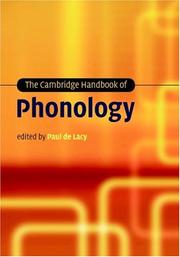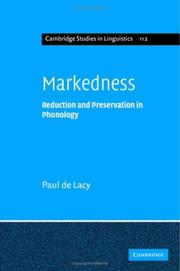| Listing 1 - 2 of 2 |
Sort by
|

ISBN: 9780521848794 0521848792 9781107404892 9780511486371 0511278454 051127727X 9780511277276 0511277865 9780511277863 9780511278457 9780511279058 0511279051 9780511481154 0511481152 1280850280 9781280850288 0511486375 9786610850280 6610850283 1107404894 1316086275 0511320574 Year: 2007 Publisher: Cambridge, UK ; New York : Cambridge University Press,
Abstract | Keywords | Export | Availability | Bookmark
 Loading...
Loading...Choose an application
- Reference Manager
- EndNote
- RefWorks (Direct export to RefWorks)
Phonology - the study of how the sounds of speech are represented in our minds - is one of the core areas of linguistic theory, and is central to the study of human language. This handbook brings together the world's leading experts in phonology to present the most comprehensive and detailed overview of the field. Focusing on research and the most influential theories, the authors discuss each of the central issues in phonological theory, explore a variety of empirical phenomena, and show how phonology interacts with other aspects of language such as syntax, morphology, phonetics, and language acquisition. Providing a one-stop guide to every aspect of this important field, The Cambridge Handbook of Phonology will serve as an invaluable source of readings for advanced undergraduate and graduate students, an informative overview for linguists and a useful starting point for anyone beginning phonological research.
Grammar, Comparative and general --- 801.4 --- Phonology --- Phonology. --- Fonetiek. Fonologie --- 801.4 Fonetiek. Fonologie --- Phonetics --- Lengua inglesa --- Fonología --- English language --- Phonetics. --- Articulatory phonetics --- Orthoepy --- Linguistics --- Speech --- Philology --- Grammar, Comparative and general Phonology

ISBN: 0521839629 9780521839624 9780511486388 9780521142236 0511241623 9780511241628 9780511242359 0511242352 0511240589 9780511240584 0511241100 9780511241109 0511486383 9786610568062 6610568065 1107162556 1280568062 0511318456 0521142237 Year: 2006 Publisher: Cambridge ; New York : Cambridge University Press,
Abstract | Keywords | Export | Availability | Bookmark
 Loading...
Loading...Choose an application
- Reference Manager
- EndNote
- RefWorks (Direct export to RefWorks)
'Markedness' refers to the tendency of languages to show a preference for particular structures or sounds. This bias towards 'marked' elements is consistent within and across languages, and tells us a great deal about what languages can and cannot do. This pioneering study presents a groundbreaking theory of markedness in phonology. De Lacy argues that markedness is part of our linguistic competence, and is determined by three conflicting mechanisms in the brain: (a) pressure to preserve marked sounds ('preservation'), (b) pressure to turn marked sounds into unmarked sounds ('reduction'), and (c) a mechanism allowing the distinction between marked and unmarked sounds to be collapsed ('conflation'). He shows that due to these mechanisms, markedness occurs only when preservation is irrelevant. Drawing on examples of phenomena such as epenthesis, neutralisation, assimilation, vowel reduction and sonority-driven stress, Markedness offers an important insight into this essential concept in the understanding of human language.
Grammar, Comparative and general --- Markedness (Linguistics) --- Marked member (Linguistics) --- Distinctive features (Linguistics) --- Generative grammar --- Linguistics --- Phonology --- Phonetics --- Phonology. --- Arts and Humanities --- Language & Linguistics --- Philology --- Grammar, Comparative and general Phonology
| Listing 1 - 2 of 2 |
Sort by
|

 Search
Search Feedback
Feedback About UniCat
About UniCat  Help
Help News
News